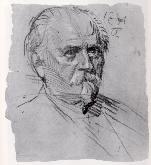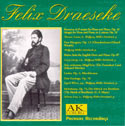Felix Draeseke: Works for Horn and Piano
|
Romance
in F major for Horn and Piano, Op. 32 |
|
| Deutsche Fassung | The
two single pieces which Felix Draeseke wrote for horn and piano
come from a period of intense creativity. Although composed
in the shadow of reworking his recently and successfully premiered
magnificent opera Gudrun and that of revising his earlier,
but never performed music drama Herrat,
Unfortunately it is impossible today to tell what level of popularity these two pieces achieved with horn players, since horn and piano recitals even today take place more seldom than concerts featuring other instrumental duos. Although the pieces were not necessarily intended to be played together, it seems logical to do just that. Thomas Crome, in the many concerts where he has played these pieces for horn, has sensed that playing them in the reverse order of opus number, as on the recording, is emotionally the more satisfying manner of presentation. © Alan Krueck 2003 |
| Click for English version |
Die zwei einzigen Stücke für Horn und Klavier, welche Felix Draeseke schrieb, enstanden zu einer Zeit des hohen künstlerischen Schaffens. Obwohl (1885) im Schatten der Umarbeitungen der gerade vor kurzem uraufgeführten großartigen Oper Gudrun und seines früheren Musikdramas Herrat komponiert, wurden diese Hornstücke von nichts anderem beeinflusst, als des Einfalls und Interessens etwas für das Horn zu schreiben. Das Adagio in A moll, Op. 31 enstand zuerst, Ende März- Anfang April 1885 und vor Mitte Mai desselben Jahres folgte eine, Romanze in F dur Op. 32 gefolgt. Beide wurden im Juni dem Kistner Verlag angeboten und sofort angenommen. Sie scheinen eine einzige Auflage erlebt zu haben, aber das besagt nichts über die Qualität dieser beiden herrlichen Stücke für das Horn. „Lyrisch“ und „gesanglich“ sind die beiden ersten Wörter, die beim ersten Anhören dieser Stücke in den Sinn kommen. Aber bei näherem Bejanntwerden besonders mit dem Adagio, empfindet man die reiche emotionale Abwechslung, die dem kühnen harmonischen Denken Draesekes zugrunde liegt. In den Musikzeitungen der Zeit wurden die Stücke gelobt und als wertvoll gepriesen und in der Kritik taucht ständig der Gedanke „Bereicherung des Hornrepertoires“ auf. Leider ist es heute unmöglich zu urteilen, welche Stufe der Popularität diese beiden Stücke bei Hornisten je ereicht hätten, da Horn und Klavier Programme auch heute seltener stattfinden als Konzerte mit anderen Instrumentalduos. Obwohl es keine Bedingung ist, die Stücke zusammen zu spielen, scheint es logisch, das zu tun In den Konzerten,in denen er diese Hornstücke von Felix Draeseke öfters gespielt hat, hat Thomas Crome, seinen Empfindungen nach, die Werke in umgekehrter Reihenfolge der Opuszahl vorgetragen, wie in AKCoburg CD. © Alan
Krueck 2003 |
| Draeseke's works for horn and piano on CD | |
AK Coburg DR 0005 [CD] Adagio
for Horn and Piano, op. 31 (1885)
|
|
[Chamber Music] [Orchestral Music] [Keyboard Music] [Top]
© All contents copyright by the International Draeseke Society
 The
Adagio in A minor, Op. 31 arose first, between the end of March
and the beginning of April, 1885 and was followed by a Romance,
Op. 32 before the middle of May of the same year. Both were
submitted to the publisher Kistner in June and immediately
accepted.They seem to have had only one printing, but that
attests nothing as to the quality of these two masterful pieces
for horn. “Lyrical” and “song like” are
the two words which come to mind on first audition of these
pieces. Upon further acquaintance however, especially with
the Adagio, one senses the rich emotional diversity based in
Draeseke’s audacious harmonic thought. The pieces were
praised in the music journals of the day declared worth while;
in the criticism the constant pronouncement “enrichment
of horn repertoire” appeared everywhere
The
Adagio in A minor, Op. 31 arose first, between the end of March
and the beginning of April, 1885 and was followed by a Romance,
Op. 32 before the middle of May of the same year. Both were
submitted to the publisher Kistner in June and immediately
accepted.They seem to have had only one printing, but that
attests nothing as to the quality of these two masterful pieces
for horn. “Lyrical” and “song like” are
the two words which come to mind on first audition of these
pieces. Upon further acquaintance however, especially with
the Adagio, one senses the rich emotional diversity based in
Draeseke’s audacious harmonic thought. The pieces were
praised in the music journals of the day declared worth while;
in the criticism the constant pronouncement “enrichment
of horn repertoire” appeared everywhere 